On October 23rd, the final chords of the 19th Chopin Competition rang out at the National Philharmonic in Warsaw. The course of the competition and the intensity of the media debate invite reflection on the phenomenon of this event.
The preserved source documents clearly indicate Fryderyk Chopin's deep patriotism, his keen concern for the fate of the country and his longing for freedom, but Chopin expressed his nationality primarily in music, composing Polish dances throughout his life, weaving Polish rhythms and musical gestures, echoes of Polish history and afterimages of Polish landscapes into his works.
At the same time, his work was rooted in centuries of European tradition – he practically revered Bach and Mozart, valued Beethoven, and was intimately familiar with Italian opera and the works of the early Romantics. He created his own unique style by drawing on this heritage, fully aware that a lasting and valuable national idiom can only be built within the framework of the highest, universal art.
These two perspectives have also accompanied the Chopin Competitions, beginning with the first one, held in 1927. Russian pianist Lev Oborin's victory at that time was met with criticism from some commentators, who lamented the loss of the distinctive character of the "Polish school," while others emphasized the benefits of diverse interpretations. Karol Stromenger wrote: "the genius loci of Warsaw […] did not demand or care about any single ideal of playing; it distinguished between the universal human character in Chopin's music and the specifically Polish character." This tension at the very origins of the Chopin Competition remains one of its most important attributes to this day.
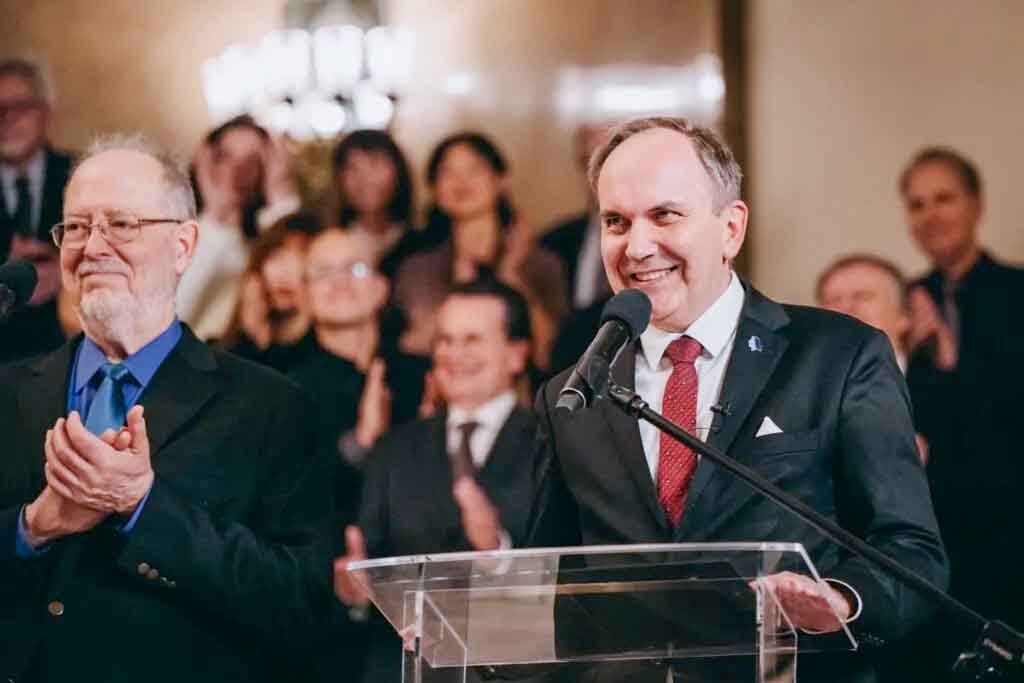
Artur Szklener – author of the text – while reading the results of the 2025 Chopin Competition. Photo: Krzysztof Szlęzak/ NIFC (Source: DlaPolonii.pl)
The essence of the competition is to invite outstanding young artists from around the world to a creative dialogue on the art of Chopin. Artists hailing from diverse cultures, endowed with diverse personalities and temperaments. As a result, the competition's laureates, alongside brilliant entertainers like Bruce Liu, include introverted romantics like Charles Richard-Hamelin, lyrical poets like Aimi Kobayashi, and philosophical thinkers like Seong-Jin Cho. Each of them interprets the Polish composer's work slightly differently, emphasizing different aspects, and each enriching its beauty in their own way.
What's also wonderful about this dialogue is the friendship between participants, older laureates coming to support younger finalists, and some even building lasting relationships off-stage. And we at the Fryderyk Chopin National Institute – as organizers – have supported the competition's distinguished personalities for years, promoting the event itself and its protagonists.
Because "how can one compete in music?"—to quote Alexander Gadjiev, winner of second prize at the previous competition (2021), posed in Jakub Piątek's award-winning documentary Pianoforte. Although the concept of musical competition has a long history, and Chopin himself observed the Paganini-Lipiński duel in Warsaw (which, incidentally, was unresolved), beauty in art eludes numbers, formulas, and objectivity, especially when the artistic standard becomes very high and extremely even, as was the case this year with the record number of entries from already-titled pianists. Clear and rather obvious criteria, such as technical preparation, memory, or complete control of the instrument, then disappear. Increasingly subtle aspects are assessed, such as the aesthetics of sound, the ability to build large musical forms, the capture of individual idioms of Chopin's style, and the authenticity of artistic expression.
The judges also consider artistic maturity and stress tolerance, trying to predict the winners' performance potential in future years. Therefore, the highest awards usually go to confident artists who demonstrate consistent performance throughout all stages, while those who are more spontaneous and often delight audiences with specific aspects of their performances are placed lower.
Piotr Alexewicz – the only Polish pianist in the final of the 2025 Chopin Competition. Photo: Krzysztof Szlęzak for NIFC (Source: DlaPolonii.pl)
Another phenomenon of the Chopin Competition is the unprecedented level of audience interest, which this year exceeded even the wildest expectations. This includes participation in auditions at the National Philharmonic, in special music lover zones, in broadcasts on streaming platforms, and in discussions. This engagement, the exchange of opinions, and even the heated debates over the verdict are arguably the most important qualities of this year's competition.
The fact that millions of people participated so actively, that in our consciousness, amidst our daily rush and informational noise, we found space and time to contemplate art, to attempt to grasp the differences in outstanding interpretations, to spiritually connect with these wonderful young artists who were closest to our sensibilities, and, moreover, that we were willing to defend our own choices, testifies to the true integration of classical music into the current of our lives and our values. I think Chopin himself would be somewhat intimidated and deeply moved. And all we can do is try to maintain even a small part of that involvement until the next edition.
Translation from Polish by Andrew Wozniewicz.
2025-12-28: Corrected the order of Seong-Jin Cho's name in the English version.



